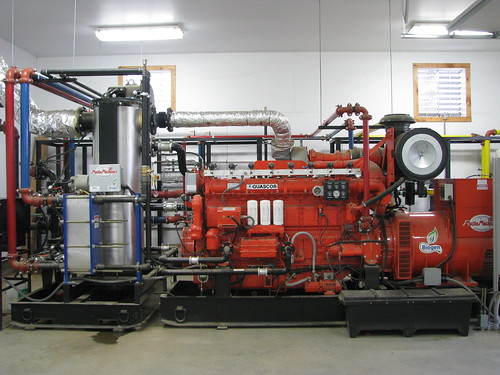
I went to an exciting open house earlier this month at the Chaput Family Farms in North Troy, Vermont showcasing how dairy farmers can convert manure into operating capital. The event featured the newly installed (August 2010) anaerobic digester, manufactured by a California firm. Approximately 150 people from the dairy industry, power companies, and the businesses that manufactured and installed the digester system joined Judith Canales the Administrator of Business and Cooperative Programs for USDA Rural Development and other government officials on a blustery, wet day to learn how the digester works and how it can invigorate cash flow for dairy operations.
Reg and Mike Chaput run an 830 cow dairy herd. The operation is truly a family operation founded by Reg and Mike’s Dad Leo. Chaput Family Farms currently employs thirteen workers. The farm is a significant part of this small town’s economy.
With slumping milk prices over the past few years, farmers have had to create other sources of revenue. Disposing of manure has always been a waste management issue for dairy farms. The digester has turned that problem into a solution. We watched the process in action. Anaerobic digesters break down organic waste in the digester where lack of oxygen and microbes in the waste encourage the generation of methane and carbon dioxide. The resulting gas is burned as fuel, generating 1.6 million kilowatts annually of clean renewable energy that Chaput Family Farms sells to the power grid. That’s enough electricity to power the farm operations plus 250 homes. The leftover solids from the digested manure are used as free, clean bedding for the cows, while the liquids become crop fertilizer, further savings to the operation. The Chaput brothers have the ability to expand their operation, as the digester was constructed to handle waste for 1,600 mature cows plus young stock.
Central Vermont Public Service’s Cow Power program provided a grant of $100,000 to help underwrite start up costs. USDA Rural Development’s Rural Energy for American program made the digester financing possible through the combination of a loan and grant totaling $916,000. The Clean Energy Development Fund contributed $716,000 and the Vermont Agency of Agriculture funded $50,000 for the project.
USDA has programs that can help farmers, ranchers and cooperatives fund biodigesters. To find out more click here. To read Agriculture Secretary Tom Vilsack’s speech concerning renewable energy for rural America click here.
